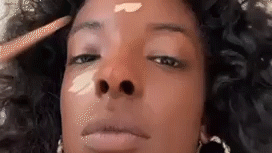Everyone on set came to the conclusion that Milan should take a car to Sephora and get the right shades. “I had to take off the makeup, redo everything,” she says. “I think I ended up getting emotional because I had to go to the store. It was just like, ‘Am I going to get paid for being the makeup artist as well?’ I also came with my hair done, you know what I mean?” The brand was apologetic and paid her for the unexpected overtime.
“I told the makeup artist and the team, ‘If you feel like you can’t do Black girl makeup or you’ve never done it before, please do not use us as test dummies,’” she tells Allure. “Because a lot of times people are like, ‘Oh, well, sometimes people don’t know and they need to practice on Black faces.’ No, you don’t. You never need to practice on a model during New York Fashion Week.”
Like Milan, model Madisin Rian — the first Black woman to be the face of Armani Beauty — has worked with contracted makeup artists on set who are unprepared for all skin tones. “Conversations are being had regarding diversity, but there is still a lack of education and accountability from the makeup artists and the brands that hire these artists,” she says. “Makeup artists should be more than equipped with the proper tools, products, education, and experiences to accommodate all skin tones and skin types.”
Rian says she’s seen positive changes with makeup brands like Armani who offer the right shades for her skin, but this issue goes further than finding your perfect foundation match. Rian hopes that brands will do more than just add one Black model for a show or a shoot and also hire Black creatives on set.
Similarly, model Jari Jones — who you might recognize from her boundary-breaking Calvin Klein campaign and NYC billboard this past LGBTQ+ Pride month — says she still deals with unprepared makeup artists at work. “I’ve had horrible experiences such as foundation being three shades lighter or the opposite direction, too dark,” she says. “I’ve had an artist who’s given up on trying to skin match me and abandoned me to do another face.” But Jones says it’s gotten better in recent years and there are the exceptions: “I’ve had artists who prioritized me and took their time to get my foundation to perfection, who made me feel like I wasn’t difficult and that getting my face to perfection was just as important as anyone on set.” She sees some positives, such as fashion brands hiring more “well-rounded makeup artists.” One of the reasons is because “models and talent are speaking up against these injustices within the workplace,” she says.

